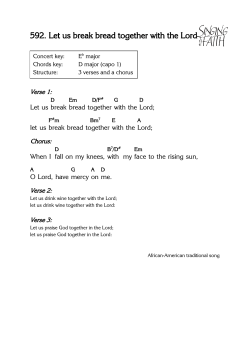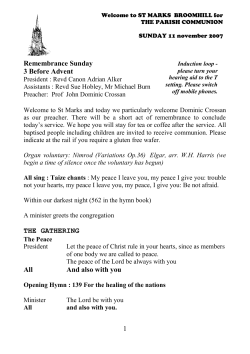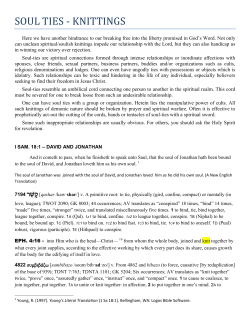
Document 196948
Z /110, How To Cope When You're Not The Boss Colossians 3:22-4:1 By his famous Proclamation of Emancipation Abraham Lincoln set the stage for the elimination of a great evil -- the evil of slavery in the United States. He declared the slaves of the Confederate states "forever free." His action was not popular with either his friends or his enemies. He was criticized on one side for not going far enough and on the other side for going too far. Nevertheless his declaration stands as a great advance in American history. It took three more years and a constitutional amendment to make it official. In 1865 the 13 th amendment was ratified: "Neither slavery nor involuntary servitude, except as a punishment for crime whereof the party shall have been duly convicted, shall exist in the United States, or any place subject to their jurisdiction." It was another 5 years before our black brothers and sisters were granted the privilege of voting. A hundred and forty years later the problems of man's inhumanity to man is still a prominent problem both in the United States and around the world. The Chinese laborers that make many of the clothes we wear are paid a scant 40 cents an hour. It's little wonder that we are shocked at the poor workmanship we find. The outrage of slavery and the prevalence of sweatshops in world today should be condemned by all of us. Yet as long as they exist there will continue to be a need for Christian counsel on how to cope and how to relate to those over us in authority. Paul's purpose was not to crusade against the immorality of slavery in the Roman Empire. A prisoner in a Roman prison cell could hardly start a revolutionary movement against his captors. His theme is not the abolition of slavery. He leaves that task for future generations to correct. However the seeds of abolition that would eventually take root and grow in America were planted firmly in Paul's epistles—especially passages like this one and in his epistle to Philemon. Paul's theme here, however, is not liberation. His theme is how to live a Spirit filled life in a fallen world. Instead of addressing the evils of the world in general, he zeroes in on the behavior of professing Christians regardless of their status in life. He teaches Christians how to behave in conditions that are less than satisfactory. The truth of the equality of all people before God abounds in his epistles. But Paul deals with real people in a real world. Many Christians today live in conditions that are less than favorable. Paul's primary emphasis in this passage is that we are all servants and we all have a Master. Both Christian slaves and Christian slave-owners serve the same Master. Paul makes that crystal clear in the first verse of chapter 4 "...you also have a Master in heaven." This passage applies to all of us who are either in authority or under authority. Many pastors apply this passage to employee and employer relationships. I believe the application is far wider than that. The Greek word translated "bondservants" can, and sometimes does, mean "slaves." I am convinced that is the primary meaning of the word here. But the emphasis is not on the captivity of slavery or the bondage of slavery. There are other, more appropriate, Greek words to define these aspects of slavery. This Greek word (doulos) emphasizes the submission and service of a slave. It is this word that Paul uses in Philippians 1:1 to describe himself and Timothy as the "bondservants of Jesus Christ." A bondservant is one who voluntarily chooses to continue in the service of his master after he is free to go. In Deuteronomy 15:12-17 God gives us the basic concept of a bondservant: "If your brother, a Hebrew man, or a Hebrew woman, is sold to you and serves you six years, then in the seventh year you shall let him go free from you. And when you 2 send him away free from you, you shall not let him go away empty-handed; you shall supply him liberally from your flock, from your threshing floor, and from your winepress. From what the LORD has blessed you with, you shall give to him. You shall remember that you were a slave in the land of Egypt, and the LORD your God redeemed you; therefore I command you this thing today. And if it happens that he says to you, 'I will not go away from you,' because he loves you and your house, since he prospers with you, then you shall take an awl and thrust it through his ear to the door, and he shall be your servant forever." He is now a servant by choice. Every Christian is in that sense a bondservant of Jesus Christ. He has purchased us and set us free. And in our freedom we have chosen to love and serve Him with all our hearts and souls. Therefore we are "bondservants." We have been purchased and set free. Christ died for our sins. We have consciously chosen to serve Him forever. From that standpoint we can see a practical application to our lives. As bondservants we serve our Lord in the home. As bondservants we serve the Lord in the church. As bondservants we serve Him in the community. As bondservants we serve Him on the job and on the campus. So this becomes very practical for all of us. God has established a definite role for each of us in the home, in the church, in the school, and in the community. We have to learn how to live within that structure. It's obvious that we can't always be the bosses, but we can all be servants. Paul tells us how to cope when we're not the boss. That's the subject of the last four verses in Colossians 3. "Bondservants, obey in all things your masters according to the flesh, not with eyeservice, as men-pleasers, but in sincerity of heart, fearing God. And whatever you do, do it heartily, as to the Lord and not to men, knowing that from the Lord you will receive the reward of the inheritance; 3 for you serve the Lord Christ. But he who does wrong will be repaid for what he has done, and there is no partiality." The first point in your outline is: 1A. How To Cope When You're Not The Boss. 1B. The first coping mechanism is to do your work as a Service to GOD. Verse 22, "Bondservants, obey in all things your masters according to the flesh, not with eyeservice, as men-pleasers, but in sincerity of heart, fearing God." 1C. It must be SINCERE Service. 1D. It's more than "eye-service." Eye-service is a performance. It's doing your job for the sole purpose of impressing others. In this case it would be your boss or your immediate supervisor. Too many people live their lives just to hear the roar of approval from the crowd. That's eye-service. The common movie about slavery leaves you with the impression that the only goal a slave had was to keep from getting flayed with a cat of nine tails. I'm sure that was the goal for many. "The Master's looking. Look busy!" That was mere eye-service. 1E. Sincere service is service without pretension. Pretension is a false show for the wrong reason. It's playacting. It is living in a make-believe world. It is hypocrisy. You remember what Jesus 4 had to say to hypocrites about their hypocrisy. Hypocrisy is sheer eyeservice. 2E. Our service is to be without ostentation. Ostentation is a showy display. If your goal is to show off your n , or laadadge, to showcase yourtale15 to parade your super-spirituality you are being ostentatious. These goals are bigtime losers in the mind of Christ and in His work. It is eye-service. Sincere service is much more than mere eye-service. 2D. Sincere service is more than being "menpleasers". "Bondservants, obey in all things your masters according to the flesh, not with eyeservice, as men pleasers, but in sincerity of heart." On the surface this thought seems to contradict the admonition of Romans 15:1-3. "We then who are strong ought to bear with the scruples of the weak, and not to please ourselves. Let each of us please his neighbor for his good, leading to edification. For even Christ did not please Himself; but as it is written, "The reproaches of those who reproached You fell on Me." There is a world of difference 5 between pleasing your neighbor for his benefit and buttering up your boss to gain a better position or to get a raise in pay. Pleasing others for their benefit, and especially for their salvation is a good thing. Paul says in 1 Corinthians 8:13, "if food makes my brother stumble, I will never again eat meat, lest I make my brother stumble." That's a very positive attitude. It is pleasing others for their benefit. Had he said, "I don't care what it does to my Christian brother, I'm not giving up my steak dinners for anybody!" That's a whole different attitude. It is a very negative attitude. Putting on an ostentatious show before the boss just to get him off my back or get a better position is a negative attitude. Doing your best work because it pleases God and hopefully satisfies your employer is a very positive attitude. Jesus' attitude toward this is evident in His evaluation of the Scribes and PhariseesSI Matthew 23. He says, ""The scribes and the Pharisees sit in Moses' seat. Therefore whatever they tell you to observe, that observe and do, but do not do according to their works; for they say, and do not do. For they bind heavy burdens, hard to bear, and lay them on men's shoulders; but they themselves will not move them with one of their fingers. But all their works they do to be seen by men." 6 Eyewash is never an acceptable motive for serving the Lord. Eyewash is something that is done only to impress an observer. Don't let that be your motive for serving the Lord Jesus Christ. It is what you are in the dark, when no one is looking, that counts. What you do when you are unsupervised weighs big in God's sight. That's just between you and Him. Our service to God must be sincere. 2C. It must also be our SPIRITUAL Service. 1D. It is wholehearted service. 1E. Wholehearted service springs from the SINCERITY of the heart. Everything we said in the previous section applies here. Sincerity is at the very heart of wholehearted spiritual worship. 2E. SIMPLICITY of heart is the second ingredient of wholehearted service. Simplicity means we are honest, faithful, and single-minded. We have only one aim, one goal, and one purpose. What is that purpose? The Westminster Catechism states, "The chief end of man is to glorify God and to enjoy Him forever." You can't state it any simpler than that. That's what we are all about, isn't it? Simple, straightforward, sincere, and single-minded service is our goal. To introduce duplicity is to bring hypocritical scheming and doubledealing deception. God wants no part of that in our service. We are to be 7 straightforward, honest, and full of integrity. That brings us to the third definition of wholehearted. 3E. It means INTEGRITY of heart. Integrity is the state of being complete and whole. It is being morally honest and spiritually sound,. That's a very rare commodity in our world today. It is hard to find men and women of real integrity. But Paul says that is one of the major qualities that should separate the Christian servant from the non-Christian servant. That's how you cope when you're not the boss—through wholehearted spiritual service. That comes from our second definition of spiritual service. 2D. It is worshipful service. We see that in the words of verse 22, "fearing God." Webster gives as a second meaning for the word "fear" "respectful dread, awe, reverence." That's how it is used here. Paul's statement in 2 Corinthians 5:11 is a good illustration. In light of the fact that we must all appear before the judgment seat of Christ to receive the appropriate recompense for what we have done in this life he says, "Knowing...the terror of the Lord, we persuade men." We must always keep that in mind. God is our ultimate Master. He is our final judge. The bottom-line on how, why, and what we do by way of service will be revealed at God's throne 8 of judgment. He reminds us in verse 12 that He will judge us not on the outward appearance of our service, but on our heart attitude. That's a very sobering thought. That is a compelling reason to serve Him wholeheartedly through worshipful service. That's how we cope when we're not the bosses. God is the ultimate beneficiary of our service. He always looks at our heart not our outward appearance. 2B. So we need to see The Lord is our SUPERVISOR. Verse 23, "And whatever you do, do it heartily, as to the Lord and not to men..." I appreciate the comment of Lloyd Olgilvie. He says, "We need to ask, 'why am I doing what I do?' The fact is that we were never meant to find meaning in our work but bring meaning to our work. When Christ is our meaning we can work creatively to praise Him. When our work becomes too important we make it a false god. That can be true whether we work on an assembly line or in the pulpit. Some of us have confused our self-worth with overwork." We tend to justify ourselves by how we perform. I firmly believe that God blesses me on the basis of my heart and not on my ability. I'm thankful that He is ultimately my Supervisor. I can safely do the things He tells me to do and leave the results to Him. That's how we cope when we're not the boss. Dr. J. Vernon McGee has a great way of bringing things into focus. He says, "Maybe you're not going to have to report to your boss; or when his back is turned he doesn't see that you are loafing on the job, that you're not really giving him a full 9 day's work. But the Lord Jesus sees all, and you are going to answer to Him. Therefore you have to give a good account of your life to Him." 2C. See The Lord is your PAYMASTER. In verses 24-25 we read, "knowing that from the Lord you will receive the reward of the inheritance; for you serve the Lord Christ. But he who does wrong will be repaid for what he has done, and there is no partiality." When I was a child we used to sing "Brighten the corner where you are." That's a good strategy for evangelism. Why did God put you here? Why were you so blessed? Why were you born a freeman or free-woman in the most prosperous nation on earth in the most prosperous time in the history of the world? Was it because you were so much better than the Arabs, the Asians, the Africans, and whoever else is out there? No, I don't believe so. Were you too good to live in the streets with poverty stricken Indians? No, I don't believe that! Not at all! Why have Americans been so blessed with such a wonderful land of opportunity? We just take it for granted. That's the way it is. We have the habit of looking up instead of down. Why weren't we born in one of those majestic palaces in Beverly Hills? I think the answer is in that little song, "Brighten the corner where you are." Paul says in 1 Corinthians 7:20, "Let each one remain in the same calling in which he was called. Were you called while a slave? Do not be concerned about it; but if you can be made free, rather use it." Does that mean we shouldn't try to better our situation? No! Absolutely not! Paul says if you can better your self, do it! "If you can be made free...use it." If not, brighten the corner where you are. 10 "For he who is called in the Lord while a slave is the Lord's freedman. Likewise he who is called while free is Christ's slave. You were bought at a price; do not become slaves of men. Brethren, let each one remain with God in that state in which he was called." A slave in Christ is far better off than his master who is outside of Christ. A slave who is in Christ is free. A master who is outside of Christ is in the most horrible form of bondage. Don't even think about changing places with him. "Brighten the corner where you are!" Christ has called you. Rejoice in that and serve Him where you are. Your treasure is laid up for you in heaven. Notice verse 24, "knowing that from the Lord you will receive the reward of the inheritance; for you serve the Lord Christ." Listen to Peter's commentary on this subject. Beginning with 1 Peter 1:3 we read: "Blessed be the God and Father of our Lord Jesus Christ, who according to His abundant mercy has begotten us again to a living hope through the resurrection of Jesus Christ from the dead, to an inheritance incorruptible and undefiled and that does not fade away, reserved in heaven for you, who are kept by the power of God through faith for salvation ready to be revealed in the last time. In this you greatly rejoice, though now for a little while, if need be, you have been grieved by various trials, that the genuineness of your faith, being much more precious than gold that perishes, though it is tested by fire, may be found to praise, honor, and glory at the revelation of Jesus Christ, whom having not seen you love. Though now you do not see Him, yet believing, you rejoice with joy inexpressible and full of glory, receiving the end of 11 your faith -- the salvation of your souls. Of this salvation the prophets have inquired and searched carefully, who prophesied of the grace that would come to you, searching what, or what manner of time, the Spirit of Christ who was in them was indicating when He testified beforehand the sufferings of Christ and ihe glories that would follow." These glorious promises have sustained God's perst,c ,k0))- people through hard times, through slavery, poverty, war, fibmumbAirand every hopeless condition of history. As we read in 1 Corinthians 2:9-10: "Eye has not seen, nor ear heard, Nor have entered into the heart of man The things which God has prepared for those who love Him. But God has revealed them to us through His Spirit. For the Spirit searches all things, yes, the deep things of God." That's how you cope when you aren't the boss. You know and serve a greater boss—the Lord Jesus Christ. Our second question is... 2A. How do you cope when you are the boss? I'll give you the short answer to this one. We see it in Colossians 4:1, "Masters, give your bondservants what is just and fair, knowing that you also have a Master in heaven." 1B. Be just and FAIR to those under you. The word "fair" is very interesting. Do you remember what an isosceles triangle is? It comes from two Greek words. The first word is "isos" meaning "equal". The second word is "celes", the Greek word for legs. So an isosceles triangle is a triangle with two equal legs. Paul uses the word "isos" meaning 12 "equal" to put across the point of fairness. You can easily see the great ramifications of that. He is telling slave owners to treat their slaves with equality. They are equal in value before the Lord. They are brothers and sisters in Christ. And they are to be treated with equal dignity. America needs to hear that message again today. We need to treat those who are less fortunate than we are with equal fairness and dignity just because it is the right thing to do. 2B. Then Paul reminds the slave owners to be aware of their own ACCOUNTABILITY to God. He reminds them that we are all slaves of the Master who lives in heaven. On this level we are all equals: slaves and masters, bond or free, rich or poor, we all have a Master in heaven. That puts us all on a level playing field, doesn't it? So how do I cope if I'm not the boss? I remind myself that I am God's servant. I do my work as a service to God. I do it with sincerity as my spiritual service to God. I see the Lord as my immediate supervisor and my paymaster. And how do I cope if I am the boss. I treat those under my watchcare justly and fairly as my equals before God and man. I remind myself that I, too, am a man who must one day answer to God to whom I am ultimately accountable. 6-cA ,fL&.ciedi C /c„, Cd.of 4,4 /D. 64, deon,i hit-7 bhp- c e-4 dpe e/P— -1-3 442_ ‘-ed 64k, ccou, -tett; . S CG v1 5 c Beret-CICi":1741 e /- Crez-A- #-e /V/ 13 :S "irrE7* 1'14 b e ez-s- ec,i0 e e---k(. /r" e ye How To Cope When You're Not The Boss Colossians 3:22-4:1 1A. How to cope when you're not the boss, 3:22-25 1B. Do your work as a Service to GOD, 22 1C. SINCERE Service 1D. More than "eye-service" 1E. Without pretension 2E. Without ostentation 2D. More than "men-pleasers" 2C. SPIRITUAL Service 1D. Wholehearted service 1E. SINCERITY of heart 2E. SIMPLICITY of heart 3E. INTEGRITY of heart 2D. Worshipful service "fearing God" 2B. See The Lord is your SUPERVISOR, 23 2C. See The Lord is your PAYMASTER, 24-25 2A. How to cope when you are the boss, 4:1 1B. Be just and FAIR 2B. Be aware of your ACCOUNTABILITY
© Copyright 2025









